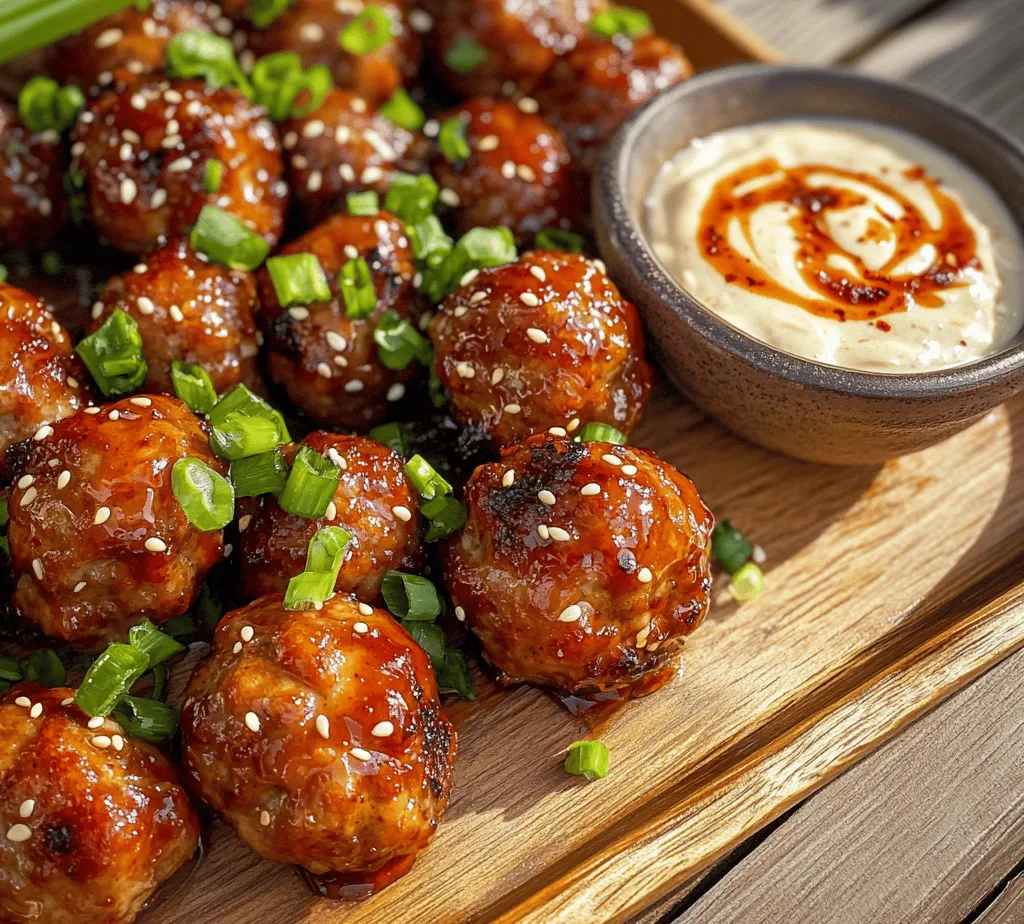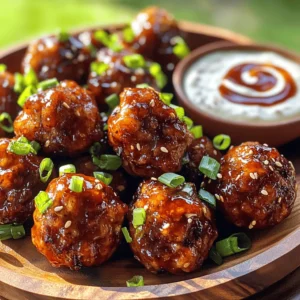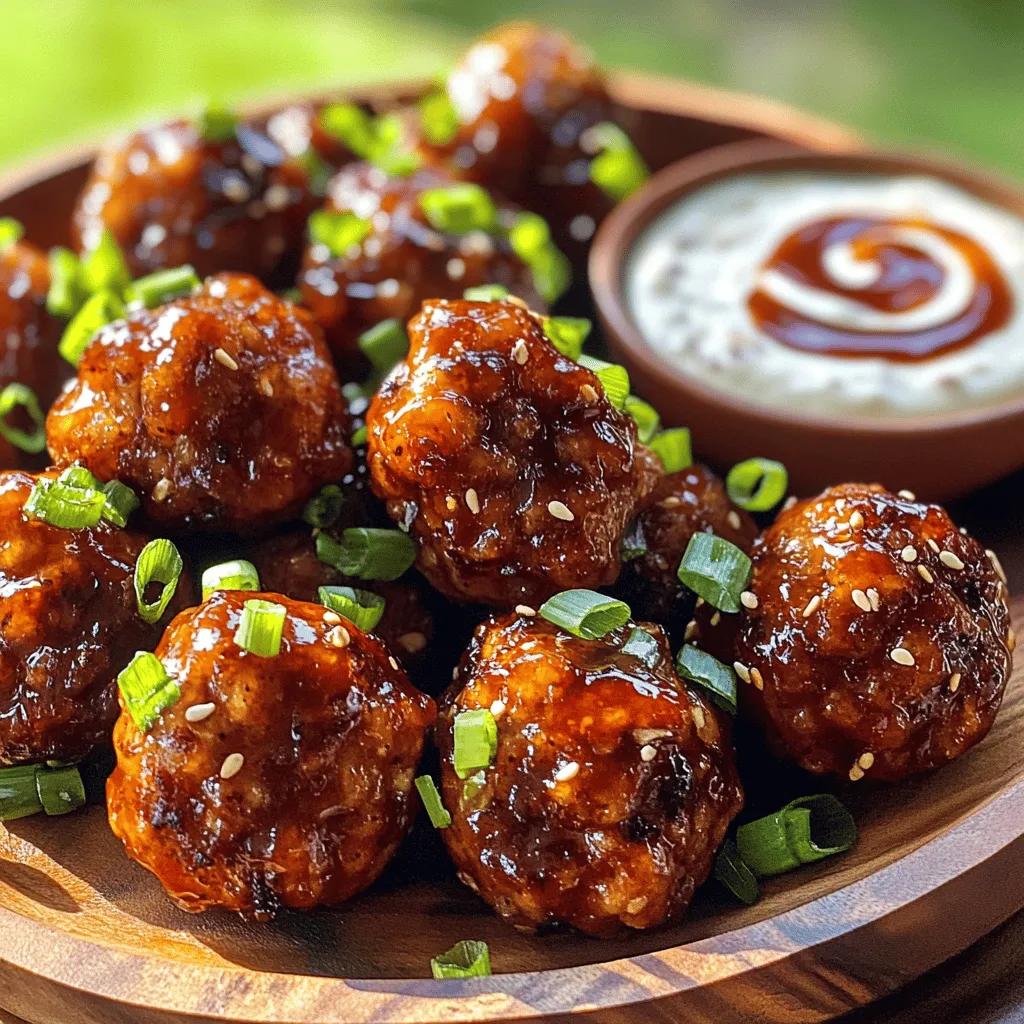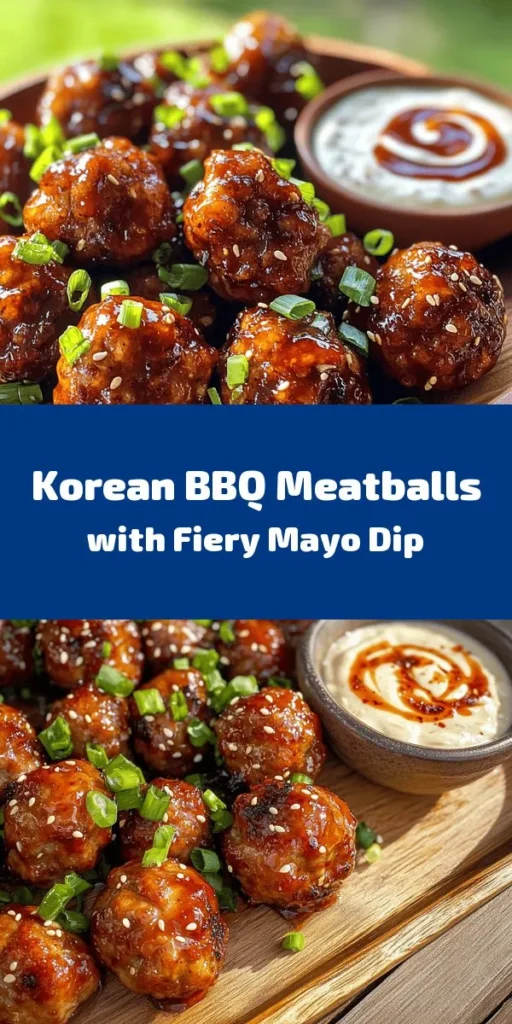In recent years, Korean cuisine has emerged as a global phenomenon, enchanting food enthusiasts with its intricate flavors and inventive combinations. Among the many delightful offerings, Korean BBQ Meatballs paired with a zesty Spicy Mayo Dip have carved out a special place in the hearts (and stomachs) of many. This recipe marries the savory essence of traditional Korean barbecue with the comforting familiarity of meatballs, making it an easy, satisfying dish that’s perfect for any occasion. Whether you’re hosting a casual gathering or looking for a new weeknight dinner option, these meatballs are sure to impress.
Understanding the Essence of Korean BBQ Meatballs
Exploring the Korean BBQ Flavor Profile
Korean cuisine is characterized by its bold flavors and harmonious balance of various taste elements, including sweet, spicy, savory, and umami. At the heart of Korean BBQ is a combination of grill-cooked meats that are often marinated to enhance their natural flavors. The robust flavor profile of Korean BBQ meatballs comes from key ingredients that are staples in Korean cooking.
Gochujang, a fermented chili paste made from red chili powder, glutinous rice, fermented soybeans, and salt, is the spicy backbone of this dish. Not only does it provide heat, but it also adds depth and complexity, making it an essential ingredient in many Korean recipes. Its slightly sweet and smoky flavor complements the savory notes of the meatballs beautifully.
Additionally, sesame oil and ginger play crucial roles in enhancing the overall taste. Sesame oil, with its nutty aroma, adds richness to the meat mixture, while ginger provides a fresh, peppery kick that brightens the dish. Together, these ingredients create a symphony of flavors that is both comforting and exciting.
The Cultural Significance of Meatballs in Korean Cuisine
Meatballs have a rich history in Korean culinary traditions, often found in various forms across the country. Known as “Sundae” when made with a blend of meats and vegetables, or “Mandu” when prepared as dumplings, meatballs reflect the communal aspect of Korean dining where sharing food is a cherished cultural practice.
Historically, meatballs were a way to utilize leftover meats and ingredients, showcasing the resourcefulness of Korean cooks. Today, they are a beloved dish, often served at family gatherings, celebrations, and even street food stalls. Each region in Korea boasts its own variations of meatballs, influenced by local ingredients and cooking methods, making them a versatile and inclusive dish that appeals to a broad audience.
Ingredients Breakdown for Korean BBQ Meatballs
To create these delectable Korean BBQ Meatballs, it’s essential to understand the core ingredients that contribute to their unique flavor and texture.
The Core Ingredients
– Ground Beef, Pork, or a Blend: The choice of meat significantly impacts the final outcome. Ground beef provides a rich, hearty flavor, while ground pork adds a touch of sweetness and moisture. A blend of both can deliver the best of both worlds, offering a juicy, flavorful meatball that holds together well.
– Panko Bread Crumbs: Unlike regular breadcrumbs, panko is lighter and flakier, providing a superior texture. They absorb moisture without becoming soggy, resulting in meatballs that are crispy on the outside yet tender on the inside. This texture is crucial for achieving the perfect meatball that doesn’t fall apart during cooking.
– Green Onions and Garlic: These aromatic ingredients are pivotal in adding flavor depth. Green onions introduce a mild onion flavor and a pop of color, while garlic contributes its signature warmth and pungency. Together, they enhance the overall taste profile of the meatballs.
The Flavor Enhancers
– Soy Sauce: A quintessential ingredient in Korean cooking, soy sauce adds a savory umami flavor that enriches the meatballs. It also helps to season the meat, ensuring that every bite bursts with flavor.
– Gochujang: As mentioned earlier, this spicy chili paste not only adds heat but also a hint of sweetness that balances the savory elements. It’s what truly sets these meatballs apart from more traditional Western variations.
– Sesame Oil and Brown Sugar: These two ingredients work in harmony to balance the flavors. Sesame oil lends a rich, nutty aroma, while a touch of brown sugar enhances the meatballs’ sweetness, creating a well-rounded taste that lingers on the palate.
Step-by-Step Instructions for Preparation
Prepping the Oven for Cooking
Before diving into the meatball preparation, it’s crucial to set up your cooking environment for success. Preheating your oven is an essential first step that should not be overlooked. The ideal cooking temperature for meatballs is around 400°F (200°C). This temperature ensures that the meatballs cook thoroughly while forming a nice, caramelized exterior.
Importance of Preheating: Preheating the oven allows for even cooking and helps to lock in moisture. When the meatballs are placed in a hot oven, they begin to sear immediately, which enhances their flavor and texture.
Using Parchment Paper: To facilitate easy cleanup and prevent sticking, line your baking sheet with parchment paper. This simple step makes it easier to remove the meatballs once they are cooked and ensures they maintain their beautiful shape.
Mixing the Ingredients
Once your oven is preheated and your baking sheet is prepared, it’s time to mix the ingredients for the meatballs. In a large mixing bowl, combine your chosen ground meat, panko bread crumbs, chopped green onions, minced garlic, soy sauce, gochujang, sesame oil, and brown sugar. Using your hands is often the best way to mix, as it allows you to feel the texture and ensure an even distribution of ingredients.
Be careful not to overmix, as this can lead to dense meatballs. Instead, gently combine all the ingredients until just blended. The mixture should be moist and hold together well.
Shaping the Meatballs
Now comes the fun part—shaping your meatballs! Using your hands, scoop a portion of the mixture (about 1.5 inches in diameter) and roll it into a ball. Aim for uniform size to ensure even cooking; a cookie scoop can also help achieve this consistency. Place each meatball on the prepared baking sheet, leaving space between them to allow for even cooking.
Baking the Meatballs
Once all the meatballs are shaped and on the baking sheet, it’s time to bake them in the preheated oven. Bake for about 20-25 minutes or until the meatballs are cooked through and have a nice, golden exterior. The internal temperature should reach 160°F (70°C) for ground beef or pork, ensuring that they are safe to eat.
During the final few minutes of baking, you can brush the meatballs with a little additional gochujang sauce for an extra layer of flavor. This step adds a beautiful glaze that enhances their appearance and provides an additional kick of spice.
With these initial steps completed, you are well on your way to creating a delicious plate of Korean BBQ Meatballs. The next part of this recipe will focus on crafting the perfect Spicy Mayo Dip to complement your meatballs, as well as tips for serving and enjoying this fantastic dish. Stay tuned as we explore more about this culinary delight!

Creating the Perfect Meatball Mixture
Crafting the perfect meatball mixture is crucial to achieving a flavorful and well-textured result. The balance of ingredients plays a significant role in the final outcome. Here are some tips for achieving the right consistency and common mistakes to avoid when mixing your meatballs.
Tips for Achieving the Right Consistency
1. Choose the Right Meat: For Korean BBQ meatballs, a blend of ground beef and pork works best. This combination provides the richness of flavor and the right amount of fat to keep the meatballs moist during cooking. If you prefer a leaner option, consider using ground turkey.
2. Add Binding Agents: Incorporating ingredients like breadcrumbs or panko, along with an egg, helps bind the meat mixture together. They absorb moisture and prevent the meatballs from falling apart while cooking.
3. Season Generously: Korean flavors are bold, so don’t hold back on seasoning. Ingredients like soy sauce, sesame oil, minced garlic, and ginger enhance the flavor profile. Additionally, adding finely chopped green onions provides freshness and a slight crunch.
4. Mix Gently: When combining the ingredients, use your hands to mix them gently. Over-mixing can lead to tough meatballs. Combine just until everything is incorporated.
Common Mistakes to Avoid When Mixing
– Too Much Liquid: If your mixture is too wet, your meatballs will be soft and may not hold their shape. Be mindful of the amount of soy sauce or any liquid ingredients you add.
– Skipping the Resting Time: After mixing, let the meatball mixture rest for about 15-30 minutes in the refrigerator. This allows the flavors to meld and aids in binding.
– Not Tasting the Mixture: Before forming the meatballs, taste a small amount of the mixture (raw meat is safe if fully cooked later) to adjust seasonings. This ensures that the final product is flavorful.
Forming and Baking the Meatballs
Once your mixture is ready, it’s time to form the meatballs and prepare them for baking.
Ideal Size for Uniform Cooking
Aim for meatballs that are about 1.5 inches in diameter. This size allows for even cooking and ensures they are not too heavy, which could lead to undercooked centers. Use a cookie scoop or your hands to shape them, ensuring they are uniform in size for consistent baking.
Techniques for Even Spacing on the Baking Sheet
1. Prepare the Baking Sheet: Line a baking sheet with parchment paper or lightly grease it with cooking spray to prevent sticking.
2. Spacing: Place the meatballs at least 1 inch apart on the baking sheet. This spacing allows hot air to circulate around each meatball, promoting even cooking and browning.
3. Baking Temperature: Preheat your oven to 400°F (200°C) for optimal results. Bake the meatballs for about 20-25 minutes or until they reach an internal temperature of 165°F (74°C).
Crafting the Spicy Mayo Dip
A delicious dip can elevate your meatballs from good to great, and a spicy mayo dip is the perfect accompaniment for Korean BBQ meatballs.
Ingredients That Contribute to the Dip’s Unique Taste
For the spicy mayo dip, you will need:
– Mayonnaise: The base of the dip, providing creaminess.
– Sriracha: This hot sauce gives the dip its spicy kick. Adjust the amount based on your heat preference.
– Sesame Oil: A few drops add a rich nutty flavor characteristic of Korean cuisine.
– Lime Juice: Fresh lime juice brightens the dip and adds a zesty note.
– Garlic Powder: For an extra layer of flavor, sprinkle in a bit of garlic powder.
Mix these ingredients thoroughly in a small bowl until well combined. Taste and adjust the sriracha and lime juice to suit your personal preference.
Adjusting Spice Levels to Suit Personal Preference
If you find that sriracha is too spicy, consider using a milder chili sauce or reducing the quantity. For those who enjoy a more intense heat, adding a dash of chili flakes or a bit of gochujang (Korean chili paste) can enhance the flavor and spice level.
Serving Suggestions and Pairing Ideas
Once your meatballs and dip are ready, it’s time to think about presentation and sides that will complement your dish.
Presentation Tips for Serving
1. Plating the Meatballs: Arrange the meatballs in a shallow dish or on a large platter. This allows your guests to easily access them while showcasing their appetizing look.
2. Garnishes That Enhance Visual Appeal: Enhance the visual appeal by sprinkling chopped green onions or sesame seeds over the meatballs. Fresh cilantro or a few slices of lime can also add a vibrant touch.
Complementary Dishes to Serve Alongside
To create a well-rounded meal, consider serving your Korean BBQ meatballs with:
– Steamed Rice or Quinoa: Both options serve as a great base to soak up the flavors from the meatballs and spicy mayo dip.
– Kimchi: This traditional Korean side dish adds a tangy crunch that pairs beautifully with the savory meatballs.
– Pickled Vegetables: A side of pickled cucumbers or radishes can provide a refreshing contrast to the richness of the meatballs.
– Beverage Pairings: To enhance the meal experience, serve with Korean beverages like Soju, Korean beer, or a refreshing iced tea.
Nutritional Information and Dietary Considerations
As with any dish, it’s essential to consider the nutritional aspects and potential dietary modifications for guests with specific needs.
Nutritional Breakdown of the Dish
A serving of Korean BBQ meatballs contains approximately:
– Calories: 250-300 calories depending on the ingredients and portion size.
– Protein: About 15-20 grams of protein from the meat.
– Carbohydrates: 10-15 grams, primarily from the breadcrumbs.
– Fats: 15-20 grams of fats, contributing to flavor and moisture.
The key ingredients in this dish, such as ground meat and sesame oil, bring essential nutrients, including B vitamins, iron, and healthy fats.
Dietary Modifications
1. Gluten-Free Adaptations: For a gluten-free option, substitute regular breadcrumbs with gluten-free breadcrumbs or crushed gluten-free crackers. Ensure that the soy sauce is gluten-free as well.
2. Low-Carb Alternatives: For a low-carb version, consider using ground chicken or turkey with almond flour instead of breadcrumbs. You can also serve the meatballs over spiralized vegetables or cauliflower rice.
3. Vegan or Vegetarian Alternatives: To create a vegan version, replace the meat with a combination of cooked lentils, finely chopped mushrooms, and plant-based binding agents like flaxseed meal combined with water. You can use vegan mayonnaise for the dip.
Conclusion: The Joy of Cooking Korean BBQ Meatballs
Korean BBQ Meatballs with Spicy Mayo Dip offer a delightful way to experience the vibrant flavors of Korean cuisine in your own kitchen. From the careful selection of ingredients to the thoughtful preparation techniques, this dish truly embodies the essence of Korean cooking. Whether you’re looking to impress guests or simply indulge in a flavorful meal, these meatballs are sure to bring joy and satisfaction to your dining experience. Embrace the culinary adventure and savor every bite of this delectable dish.



